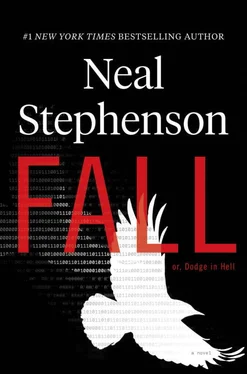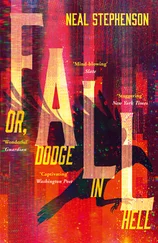The d’Aulaire books had been new when Richard had been young. He had worn out his boyhood copy, paging through it again and again, memorizing the lineages of the Titans, the gods, and whatnot, but mostly just staring at the pictures, letting them invade and shape his brain. In their general style they had a lot in common with little-kid art, which was probably what made them glom on to kid neurons like herpes. And like herpes, those pictures had remained silent and dormant in his central nervous system until adulthood. This had been triggered and made virulent by his having spied them in an unguarded moment. In the bookstore last weekend, he had approached the display like an ancient Hellene ascending the steps to the Temple of Zeus, and beheld the book, just like he remembered it, but brand new and unworn, with a new preface written by a famous modern novelist who had apparently had what Richard had had in the way of an infatuation with these books. Sophia, dragged along the whole way as she had been hugging his thigh and using his trouser leg as a handkerchief, had sensed something of the numinous in her uncle’s reaction; she had looked up and been infected. Richard had bought Greek and its companion volume Norse and taken Sophia back to the penthouse for a day’s total immersion, then handed her back to her parents an obsessed changeling, jabbering about Hydra remediation tactics and the house-sized mittens of Utgardsloki, reprimanding her elders for mixing up the Greek and Roman names of the gods. Great had been the wrath of Sophia when it had been discovered that the books had been left behind in the Whole Foods sack. Wide-famed would be Uncle Richard’s deed this afternoon when, following his outpatient procedure, he would swing by the young family’s condo with a d’Aulaire under each arm.
In the meantime, he needed to settle one small point of mythological confusion, lest Sophia find out that he was not perfectly clear on the matter, and take him to task. It had to do with Fates and Norns.
One of Richard’s first acts upon picking up Greek in the bookstore had been to thumb to its index and look up “Furies.” He had done so in a furtive, somewhat guilty frame of mind. A peculiarity of Richard’s was that he lacked a conscience or superego in the normal senses of those terms. His was a soul lacking any built-in adult supervision. In the course of his life, however, he’d had ten or so girlfriends of consequence. All of those relationships had gradually gone sour as those girlfriends had got to know him more thoroughly and drawn up manifests of all that was wanting in Richard. Some of them had kept their opinions to themselves until a relationship-ending moment of cathartic outpouring. Others had registered frank objections in real time. But Richard remembered every word of it, decades after they had presumably forgotten about him. And more than that, his brain had somehow contrived fully autonomous simulacra of these ex-girlfriends, which lived on between his ears immortally, speaking to him at the strangest times, actually changing the way he thought and behaved; before firing an employee or overlooking someone’s birthday he would pause to consider the consequences that would follow as one or more of the Furious Muses—as he called them—would coalesce from his brain vapors long enough to deliver a few choice remarks that would make him feel bad. This conflation of Furies and Muses was, of course, an invention of his own, and the sort of deviation from mythological purity for which Sophia (already turning into a sort of junior-league Furious Muse) would call him to account. He’d been carrying the idea around in his head for so long that the line between those two categories of subgoddesses had become blurry, and so he thought it would be illuminating, now that he had the ur-book in hand, to look them up.
The F section of the index was very short, having only two entries: “Fates” and “Furies.” The latter being a mere cross-ref to the more correct “Erinyes.” The former were glossed as “three old goddesses who determined the life span of man.” Richard had merely scanned those words, since he was really interested in the Furies. Cross-reffing to “Erinyes” (“avenging spirits”), he turned to page 60, their first appearance in the book, and read of souls crossing the Styx (in a ferry no less) and drinking from the spring of Lethe under “dark poplars,” causing them to forget who they were and what they had done during their mortal lives. Fine. But then it said “great sinners” were sentenced to suffer forever under the whips of the Furies. So, that part of it matched up pretty well with Richard’s Furious Muses concept. It was troubling, however, to think that you could be whipped forever in punishment for sins that you had forgotten under the dark poplars. The sinners in the Christian version of hell could at least remember why they were burning in eternal fire, but these poor dumb Greeks could only suffer without knowing why; without, for that matter, even remembering what it was like to be alive and to not suffer. It wasn’t even really clear to Richard that a post-Lethe soul could even be considered the same being, for weren’t your memories a part of you?
And yet it all rang true on some level. He did feel sometimes that he was continuing to suffer guilt pangs for acts he had long ago forgotten—deeds done when he wasn’t the same person. And who hasn’t known a sad sack, a hard-luck case who seems to be undergoing eternal punishment for no particular reason?
The next Erinyes reference happened to occur just before a two-page spread featuring the more cheerful topic of the Muses, which was good stuff, way more Sophia-appropriate, as well as reminding Richard that his own Furious Muses were at least as creative as retributive, for some of his best work had emerged from imaginary dialogues with those estimable ladies. So “Furies” had been the text he was after, and “Fates” an accidental subtext—but this morning something about it was nagging at him.
It had to do with the threads. Lying in bed a minute ago he’d been thinking about the thread of consciousness, and how severing it—breaking the brain–body link—was the key to a proper nap. And he knew that somewhere in d’Aulaire was a picture of the Fates spinning, measuring, and cutting thread. He looked all through Greek as he drank his coffee, and found it not.
The coffee was unutterably fantastic. The machine cost more than Richard’s first car and there was nothing known to coffee technology that was not embodied in its hardware and its algorithms. The beans had come from an artisanal roaster a hundred yards away—a nimble coffee startup founded by java wizards who had been brought here to work for Starbucks and spun out the moment their stock options had vested. The taste of the coffee was not wonderful, however, merely because the machine and the roasters had done such good jobs, but in the categorical sense that Dodge was awake, he was alive, he was actually physically tasting this stuff with his body in a way that sleeping-Dodge-in-a-dream could never have done. In that sense awake Dodge was as superior to sleeping Dodge as a living person was to a ghost. Dreaming-of-coffee Dodge was to drinking-coffee Dodge as one of the shades in Hades—likened, in d’Aulaire, to dry leaves whirling about in a cold autumn wind—was to a living, flesh-and-blood person.
He exhausted the first cup while looking for the thread-cutting picture. He did find a textual description of the spinning, measuring, and cutting operations being carried out by Clotho, Lachesis, and Atropos, respectively, but not the illustration that he clearly remembered showing to Sophia just a couple of days ago.
On his second cup of coffee he had the idea of checking Norse . And there it was: a full-color half-pager of three blondes—here, they were called Norns—spinning the threads of life at the base of the world tree. Urd, Verdande, and Skuld. Names and hair color aside, they seemed to be a direct drop-in replacement for their Greek equivalents.
Читать дальше
Конец ознакомительного отрывка
Купить книгу

![Нил Стивенсон - Криптономикон [litres]](/books/23868/nil-stivenson-kriptonomikon-litres-thumb.webp)






![Нил Стивенсон - Падение, или Додж в Аду. Книга первая [litres]](/books/392729/nil-stivenson-padenie-ili-dodzh-v-adu-kniga-perva-thumb.webp)
![Нил Стивенсон - Лавина [litres с оптимизированной обложкой]](/books/414066/nil-stivenson-lavina-litres-s-optimizirovannoj-ob-thumb.webp)

